Why Use Compost Tea For Cannabis Cultivation?
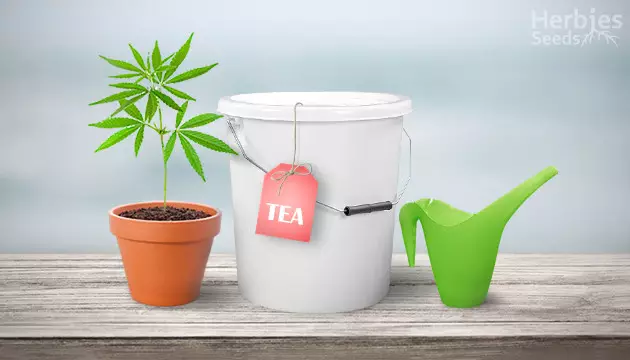
If you've been a cannabis cultivator long enough, there's one truth you probably know: growing healthy cannabis plants isn’t as simple as taking an evening walk into your garden and doing some basic watering. It takes work and proper measures. One of those measures includes vamping up your soil with more plant nutrients to improve the health of your cannabis plant. This is where the compost tea comes in.
What Is Compost Tea And Why You Should Care?
Compost tea is made of compost, aerated water and some other nutritious ingredients. It’s produced by extracting the bacteria, protozoa, fungi and nematodes from pure compost (which is mostly waste products like food scraps, grass trimmings, eggshells, etc.).
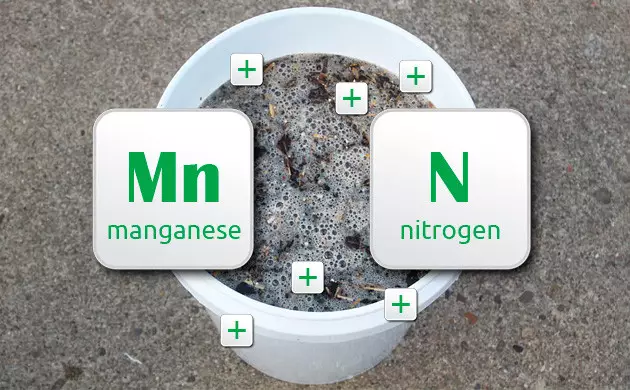
The compost contains all the essential microorganisms (bacterial and fungal entities) as well as highly necessary soil nutrients such as manganese and nitrogen to boost soil reliability, which results in healthier weed plants. When applied, the compost transfers these compounds to the soil and plants. However, these nutrients, beneficial bacteria and fungal entities do more than just produce better growth in cannabis. Thanks to beneficial microorganisms in compost tea, cannabis plants also get better natural protection from harmful diseases.
Is Making Compost Tea Worth It?
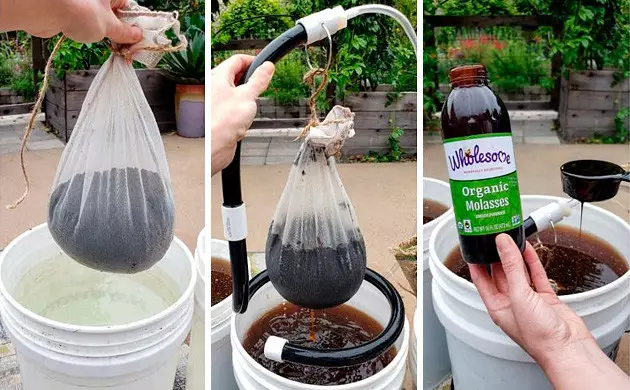
Compost tea has proven to be effective in making less efficient soils completely useful again. Here’s how. Compost tea does an excellent job of introducing living organisms into your plant’s soil, which leads to processes that fight soil pathogens. This results in more nutrients being released and creating a better shield against cannabis plant diseases. Here’s a list that explains the benefits even better.
Compost Tea For Vigorous Cannabis Growth
Compost tea contains all the nutrients (including manganese and nitrogen) that your cannabis plant needs for healthy growth, especially during the vegetative stage. Home-brewed compost tea is a perfect liquid feed for your cannabis plant. Most organic growers who favor a more natural and pure cannabis plant prefer to use this brown soup only, since it contains all the necessities for a healthy and rapidly growing weed plant. It can also serve as a worthy addition when you're looking to boost growth during cultivation. However, whether used as an additive or purely as a full-cycle organic fertilizer, choosing an appropriate compost tea recipe for the bloom of your cannabis plant is a rewarding choice.
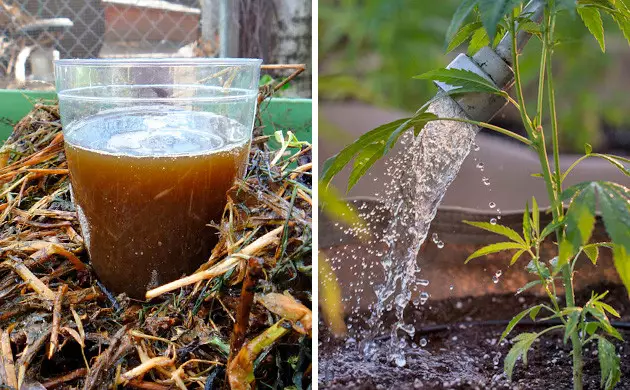
Great Base For Growing Beneficial Microorganisms
Nothing hurts your weed plant more than bad soil. It may survive and try to sprout some harvest here and there, but it won’t thrive. Soils are usually unconducive due to the absence of microorganisms that break down nutrients from food into usable entities for your weed plant. A small presence of these organisms (bacteria or fungal colonies) would make for a low-quality soil. Introducing compost tea into your soil is an excellent approach to getting fresh compost microorganisms ‘into the game’ of cultivating your cannabis, as the presence of these microorganisms will enhance the soil’s ability to push your cannabis plant to providing a high yield.
A 100% Organic Substitute For Fertilizers
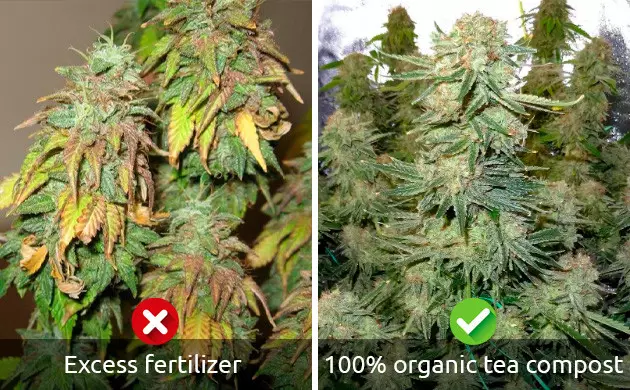
Excessive amounts of fertilizer are detrimental to the beneficial microorganisms that help sustain your plant's health; compost tea is not. On the contrary, it’s a natural and pure mixture that uses simple ingredients (which we’ll be looking at later) to make sure you have a healthier cannabis plant in your garden. Pure compost provides everything your weed plant needs for the best growth possible. From microorganisms that break down complex nutrients to considerable amounts of macro and microelements (nitrogen, manganese, copper, iron, zinc, etc.), your plants get all of this from compost tea.
Ingredients Of Effective Compost Tea
Making the best compost tea for cannabis shouldn’t take excessive planning. All you need is a simple compost tea recipe to help with growing your weed plant. However, to get a compost tea of superior quality and effectiveness, you need to consider a number of factors including air pressure, water quantity and compost type, among others. Moreover, enough thought must be put into the ingredients that will make up your compost tea. Here's what your list of compost tea ingredients should ideally look like.
Compost
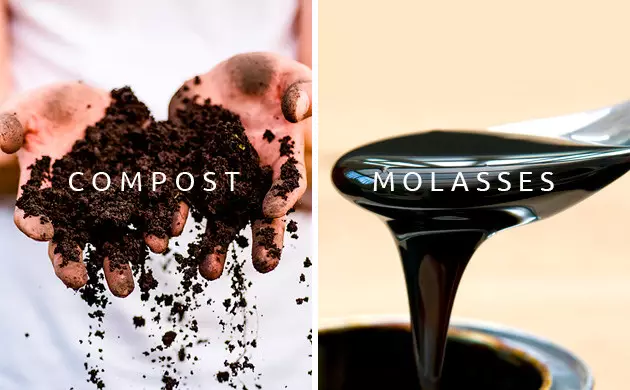
Obviously, this ingredient is the first you should get when making arrangements for compost tea brewing. Compost that will encourage your weed plant growth must be of excellent quality, containing beneficial groups of bacteria, fungi, protozoans and nematodes to reenergize the food web in the soil. Here’s a helpful hint: getting your compost bin ready for when you need it can come in handy. It could take years to build that assortment of soil-feeding greenery and brown items. Nonetheless, it's always worth the wait. Just start collecting organic material such as food scraps, leaves and twigs as soon as possible. However, if you want to make compost tea but lack the main ingredient, store-bought compost will work fine.
Molasses
Part of making a compost tea is adding some extra nutrients for a better effect on your cannabis plant. Compost contains more than it seems to the naked eye. The presence of millions of fungal colonies and bacterial entities is what gives compost its strength. These bacteria in compost need food. Introducing molasses into your compost brewing process allows the bacteria to feed and continue their function as active microorganisms in the soil food web. However, the addition of molasses is optional if you believe your compost to be high-quality enough to fully cater to your plant's needs.
Worm Castings
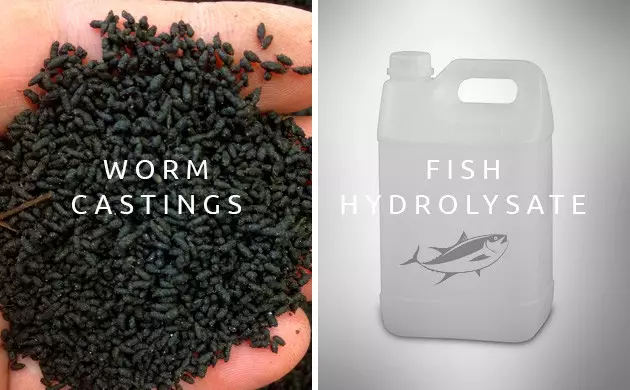
Worms are more than the cylindrical moving creatures, especially when it comes to cultivation. Let us explain. Worm castings (the by-product of a worm after the digestion of food) is an excellent supplier of nutrients like concentrated nitrates, phosphorus, magnesium, cobalt, copper, zinc, borax, nitrogen and manganese, all of which are required for plant growth. The nutrients from worm castings are already broken down into digestible bits that can be easily absorbed by the weed plant. While making compost tea for cannabis, it’s necessary to include this nutrient filler to ensure your compost tea is perfect for application.
Fish Hydrolysate
Nitrogen is the basic component of any good soil. It serves as the organic matter that forms the building blocks of nucleic acids, proteins and other necessary chemicals, making it a super essential plant nutrient, especially during the vegetative period of plant growth. Fish hydrolysate contains a large amount of nitrogen, and especially when combined with crustaceans, it works best to produce a healthy, disease-immune cannabis plant. Even more, the inclusion of fish hydrolysate also provides feed for the beneficial micro fungi present in compost.
Kelp

Using compost tea for flowering cannabis gets even better when kelp is part of the mixture. Kelp serves as food for fungi that’s present in the compost sample. It also helps the growth of fungal colonies in homemade compost tea by providing surfaces to attach to as they develop.
Oxygen
Aerating your compost tea is vital for organisms in it to live well. This means you need an excellent oxygen system to get going. Most of the time, in order for organisms present in compost to develop faster, the mix should be rich in oxygen. You need to provide this essential element if you want to avoid ending up with toxic compost tea. While brewing, use a good air pump. It’s suggested that a pump with a 6ppm threshold will serve you well for your brewing activity.
Equipment Needed To Make Compost Tea
Once you have the ingredients in place, you’ll need to have the necessary equipment at hand. Some things you shouldn’t miss are a bucket, a strainer, an air pump, an aerator, and a mesh bag.
Making Your Own Compost Tea: A How-To
We’ve finally come to the part where you can get your hands busy with mixing your compost and other ingredients and putting it to work as an excellent compost tea. Here’s a step-by-step
procedure to guide you through the process.
Get A Bucket Of Water
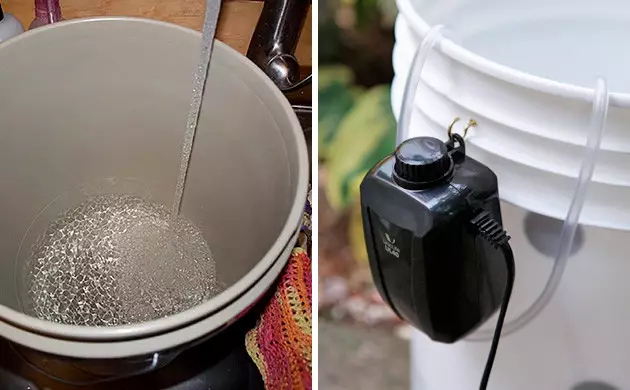
This is where it all begins. First, pour 4 liters of water (about a full gallon) into a bucket. Ensure you use fresh water; otherwise, you’ll have to aerate it to remove chlorine, which isn’t suitable for the bacteria in the compost and is known to reduce the amounts of this in soil.
Fix The Air Pump
Attach your air pump to the outside of the bucket, and connect the aerator if you’re not using fresh water.
Add In The Compost
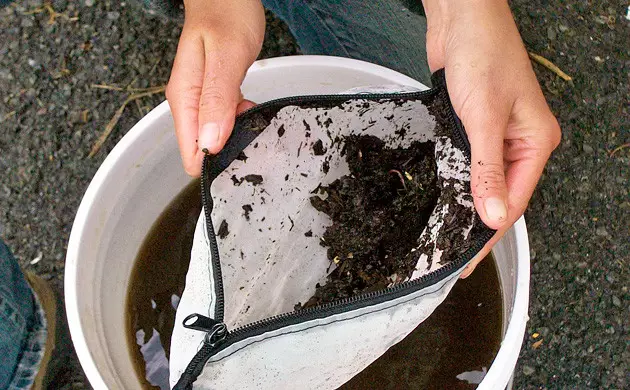
It's time to add the compost and other extra ingredients (like molasses and kelp) into the bucket with water. It’s better to place the additives of this step into a clean pair of pantyhose or a mesh bag first to avoid making a mess. The standard dilution rate is 110-225g (4-8 oz) of compost to 4 liters (1 gallon) of water.
Keep An Eye On The Temperature
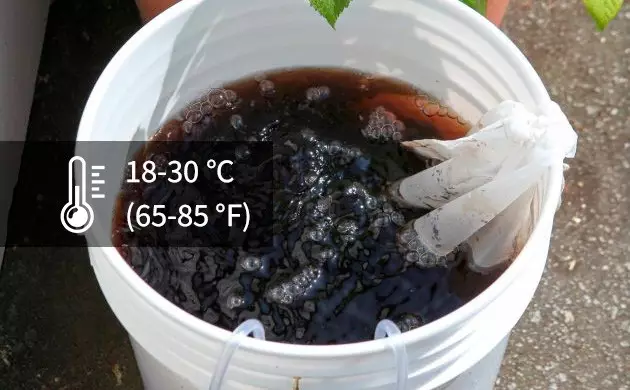
The compost tea is now in its brewing stage. At this point, it’s necessary to monitor the temperature for best results. The ideal temperature for compost tea brewing is around 18-30 C (65-85 F). Brewing your tea in warmer temperatures could hasten the process faster, creating an environment that allows pathogens to grow. A colder temperature will reduce the populating ability of microorganisms. Also be sure to avoid direct sunlight on your compost tea.
Tweak The Formula In The Process
Additional ingredients could be added depending on what you’re looking to achieve with your compost tea. If there’s a low fungal presence in your compost, you may add steel cut oats and shrimp shells to increase fungal activity. Fish hydrolysate and worm castings will serve well for a nitrogen boost. It could take 24-36 hours for the brewing process to be complete. After this time, your compost tea is ready for use. As you’ll see in the next segment, you can apply it in a number of ways.
Using Compost Tea On Your Cannabis Plants
You’re now done creating your compost tea, and it’s time to use your homemade cannabis growth and health booster. So, how exactly can you apply it?
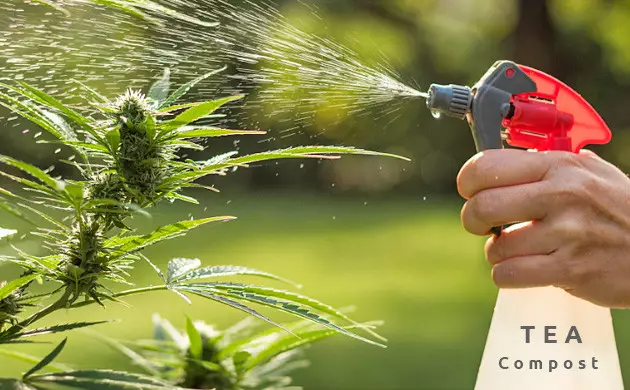
Compost tea can be applied to both the roots and leaves of the weed plant by root drenching or by spraying, respectively. Root drenching is excellent if you want the presence of microorganisms in your soil to increase, allowing better nutrient uptake via your plant's root system. Most cultivators suggest applying compost teas when plants and soil are moist to ensure that beneficial microbes remain alive. You can apply compost at regular watering intervals or monthly for the best results – just see how your plant feels after each application and fix the schedule accordingly.
You can also spray your plants with compost tea. “What for?”, you may ask. The answer is simple: beneficial microorganisms in compost tea will occupy the foliage and other areas of the plant that could otherwise be overtaken by pathogenic organisms. However, avoid spraying your plants with compost tea during flowering – you don’t want this mixture to affect the taste of the buds and your smoking experience.
Ready To Improve The Soil Quality?
With the growing trend and evidence of using organic additives for cannabis cultivation, it’s not hard to tell that compost tea is effective. The fun part of this is that you can make the excellent cannabis feed at home from simple materials. We hope you’ve learned a thing or two about brewing your own compost tea with these simple steps. Do you have any questions left? Leave them in the comments below – we at Herbies and your fellow growers will be happy to help!
Herbies Head Shop expressly refuses to support the use, production, or supply of illegal substances. For more details read our Legal Disclaimer.




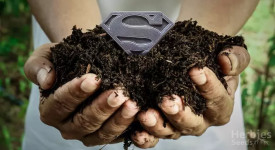



Thank you for leaving a comment for us!
Your feedback will be posted shortly after our moderator checks it.
Please note that we don’t publish reviews that: